Wall Street ends mixed in the face of mounting uncertainties




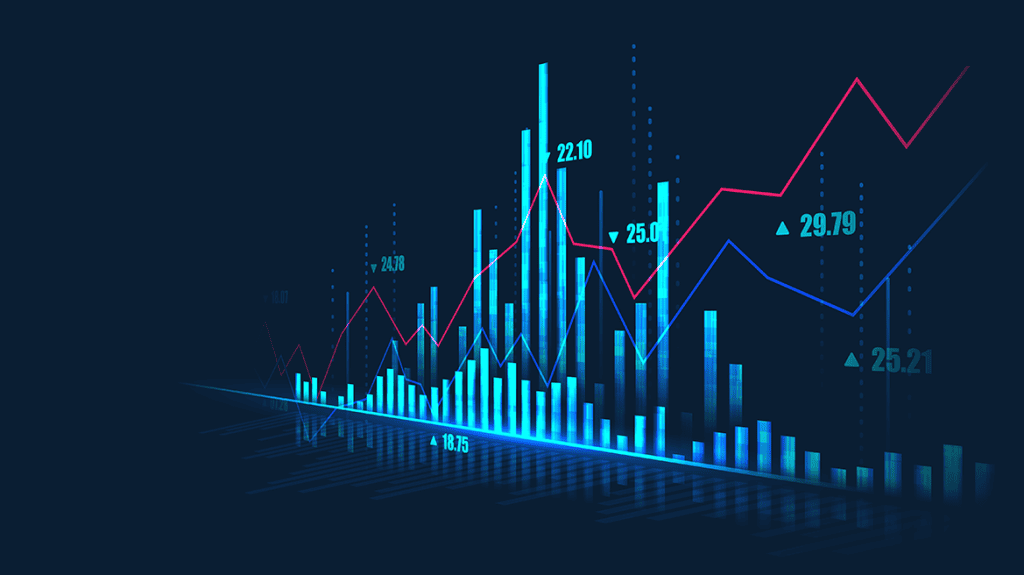
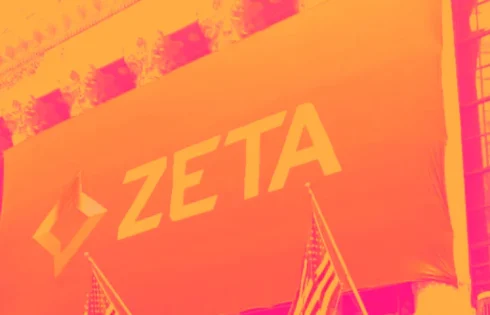
Advertising and marketing company Zeta Global (NYSE:ZETA) announced better-than-expected revenue in Q4 CY2024, with sales up 49.6% year on year to $314.7 million. Revenue guidance for the full year exceeded analysts’ estimates, but next quarter’s guidance of $254 million was less impressive, coming in 1.2% below expectations. Its GAAP profit of $0.06 per share was $0.02 above analysts’ consensus estimates.
Revenue: $314.7 million vs analyst estimates of $295 million (49.6% year-on-year growth, 6.7% beat)
EPS (GAAP): $0.06 vs analyst estimates of $0.04 ($0.02 beat)
Adjusted EBITDA: $70.38 million vs analyst estimates of $65.84 million (22.4% margin, 6.9% beat)
Management’s revenue guidance for the upcoming financial year 2025 is $1.24 billion at the midpoint, beating analyst estimates by 2.4% and implying 23.3% growth (vs 37% in FY2024)
EBITDA guidance for the upcoming financial year 2025 is $256.5 million at the midpoint, above analyst estimates of $241 million
Operating Margin: 2.2%, up from -15.1% in the same quarter last year
Free Cash Flow Margin: 6.2%, down from 9.6% in the previous quarter
Market Capitalization: $5.14 billion
“At Zeta, we’ve consistently skated to where the puck is going. Our early investments in AI and first-party data are resonating with customers and prospects, fueling our record fourth quarter results and contributing to our market share gains,” said David A. Steinberg, Co-Founder, Chairman, and CEO of Zeta.
Co-founded by former Apple CEO John Sculley, Zeta Global (NYSE:ZETA) provides software and data analytics tools that help companies market their products to billions of customers.
The digital advertising market is large, growing, and becoming more diverse, both in terms of audiences and media. As a result, there is a growing need for software that enables advertisers to use data to automate and optimize ad placements.
Reviewing a company’s long-term sales performance reveals insights into its quality. Any business can have short-term success, but a top-tier one grows for years. Thankfully, Zeta’s 29.9% annualized revenue growth over the last three years was impressive. Its growth beat the average software company and shows its offerings resonate with customers, a helpful starting point for our analysis.

This quarter, Zeta reported magnificent year-on-year revenue growth of 49.6%, and its $314.7 million of revenue beat Wall Street’s estimates by 6.7%. Company management is currently guiding for a 30.3% year-on-year increase in sales next quarter.
Looking further ahead, sell-side analysts expect revenue to grow 20.2% over the next 12 months, a deceleration versus the last three years. Still, this projection is noteworthy and suggests the market sees success for its products and services.
Unless you’ve been living under a rock, it should be obvious by now that generative AI is going to have a huge impact on how large corporations do business. While Nvidia and AMD are trading close to all-time highs, we prefer a lesser-known (but still profitable) stock benefiting from the rise of AI. Click here to access our free report one of our favorites growth stories.
The customer acquisition cost (CAC) payback period represents the months required to recover the cost of acquiring a new customer. Essentially, it’s the break-even point for sales and marketing investments. A shorter CAC payback period is ideal, as it implies better returns on investment and business scalability.
Zeta is extremely efficient at acquiring new customers, and its CAC payback period checked in at 1.4 months this quarter. The company’s rapid recovery of its customer acquisition costs indicates it has a highly differentiated product offering and a strong brand reputation. These dynamics give Zeta more resources to pursue new product initiatives while maintaining the flexibility to increase its sales and marketing investments.
We were impressed by Zeta’s optimistic EBITDA guidance for next quarter, which blew past analysts’ expectations. We were also glad its full-year EBITDA guidance trumped Wall Street’s estimates. On the other hand, its revenue guidance for next year suggests a significant slowdown in demand and its revenue guidance for next quarter fell slightly short of Wall Street’s estimates. Overall, we think this was still a decent quarter with some key metrics above expectations. The market seemed to focus on the negatives, and the stock traded down 7.3% to $19.10 immediately after reporting.
Is Zeta an attractive investment opportunity right now? The latest quarter does matter, but not nearly as much as longer-term fundamentals and valuation, when deciding if the stock is a buy. We cover that in our actionable full research report which you can read here, it’s free.
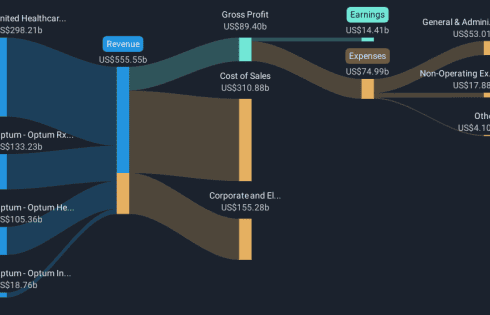
UnitedHealth Group (NYSE:UNH) experienced a share price decline of 11% over the past week, amid a mixed landscape for major U.S. stock indexes grappling with a broader market downturn. The announcement of a $2.10 cash dividend, set to be paid in March 2025, was among the key events during this period, potentially impacting investor sentiment due to its financial implications. As the Dow Jones recorded its worst week since October last year and tech stocks faced significant pressure, UnitedHealth Group was not immune to these market forces. Notably, the Dow managed a slight recovery of 0.2%, but the overall tech and healthcare segments remained under stress, influencing UNH’s recent performance. The decline aligns with a period where investors are keeping a keen eye on upcoming economic indicators, possibly fueling volatility and affecting risk assessment across various sectors.
Despite the recent week’s challenges, UnitedHealth Group (NYSE:UNH) has shown resilient growth over the last five years, achieving a total shareholder return of 83.80%. Even so, over the past year, the company underperformed against the US Healthcare industry and the broader US market. A key influencer was an $8.3 billion one-off loss reported in December 2024, impacting earnings. Additionally, legal challenges, including a class action lawsuit in January 2024 over their acquisition of Change Healthcare, may have affected investor confidence.
In September 2022, UnitedHealth’s partnership with Walmart to expand healthcare services highlighted a proactive expansion strategy, which could have positively influenced its longer-term returns. Despite these efforts, the company’s high price-to-earnings ratio compared to peers suggests a relative overvaluation within the industry, possibly weighing on investor sentiment. These elements collectively paint a comprehensive picture of UnitedHealth’s share performance over recent years, reflecting both growth initiatives and challenges faced in the marketplace.
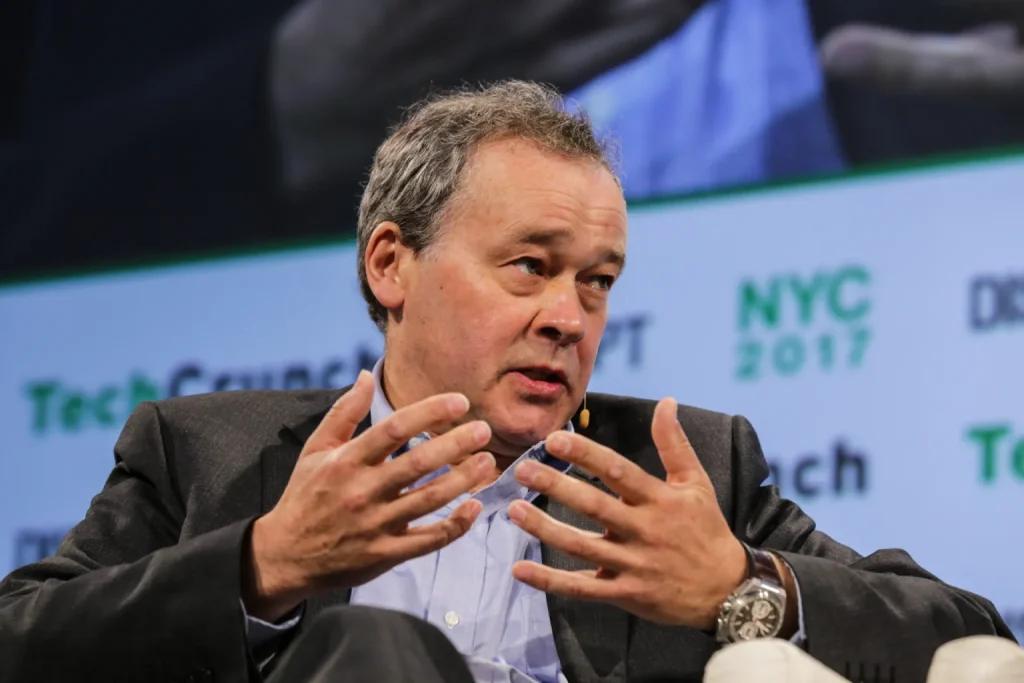
Lucid Motors is changing CEOs for the first time in nearly six years. The company announced Tuesday that Peter Rawlinson is stepping down from the CEO and CTO roles that he’s held since before the company went public. Rawlinson has also left Lucid’s board, according to a regulatory filing.
Lucid appointed its chief operating officer Marc Winterhoff as its interim CEO. Rawlinson will serve as “strategic technical advisor” to Turqi Alnowaiser, who is chairman of the board and a top executive at Saudi Arabia’s sovereign wealth fund — Lucid’s majority owner. The leadership change comes at a critical time for Lucid Motors, which just launched its Gravity SUV late last year. Lucid Motors has high hopes for the electric SUV. The company’s first vehicle — the Air sedan — has struggled to come anywhere near the sales targets it once projected when it went public in 2021. The Gravity is still in the process of being slowly rolled out to early customers, employees, and other people close to the company. “Now that we have successfully launched the Lucid Gravity, I have decided it is finally the right time for me to step aside from my roles at Lucid,” Rawlinson said in a statement. “I am incredibly proud of the accomplishments the Lucid team have achieved together through my tenure of these past twelve years. We grew from a tiny company with a big ambition, to a widely recognized technological world leader in sustainable mobility.” Rawlinson can occupy the advisor role until February 2027, and will receive a “monthly payment of $120,000 for services rendered,” along with a complimentary Lucid EV, health insurance, a $2 million stock grant, and more, according to a regulatory filing. Rawlinson came to Lucid Motors in 2013 back when it was still known as Atieva, and was primarily focused on developing battery packs and other EV powertrain components. He had previously been employed at Tesla as the chief engineer of the Model S sedan — a fact that Tesla CEO Elon Musk has repeatedly tried to obscure. Lucid announced Rawlinson’s transition alongside its financial results for the fourth quarter of 2024, as well as for the full year. The company ultimately delivered 10,241 EVs across 2024, up from just 6,001 in 2023. That generated $808 million in revenue, up from $595 million in 2023. But Lucid still lost a whopping $2.7 billion last year. It lost $2.8 billion in 2023. Lucid said Tuesday that it plans to double production to around 20,000 EVs in 2025. Lucid finished the year with $1.6 billion in cash and equivalents. It repeatedly tapped Saudi Arabia for billions in funding throughout 2024 to help stay afloat until the launch of the Gravity — despite Rawlinson telling the Financial Times last March that he felt it was “dangerous” to behave like the Kingdom was a source of “bottomless wealth.” Winterhoff said on a conference call Tuesday that Rawlinson “will not be part of the day-to-day business,” and said the former CEO will only be involved if Lucid’s chairman asks. “If there are questions arising and the chairman thinks it is worthwhile to involve Peter, then he will, but it’s up to the discretion of the chairman to have that interaction,” Winterhoff said. Rawlinson was not part of the call — something that analyst John Murphy from Bank of America called out as odd. “I’m just curious, you know, why Peter isn’t present, and why you would make an announcement like this without a successor?” he asked. “I know it’s a tough question, but I mean, it’s the one that everybody’s thinking.” “I think we clearly announced that Peter made the decision that after 12 years, it’s now a good time to pass the baton,” Winterhoff said.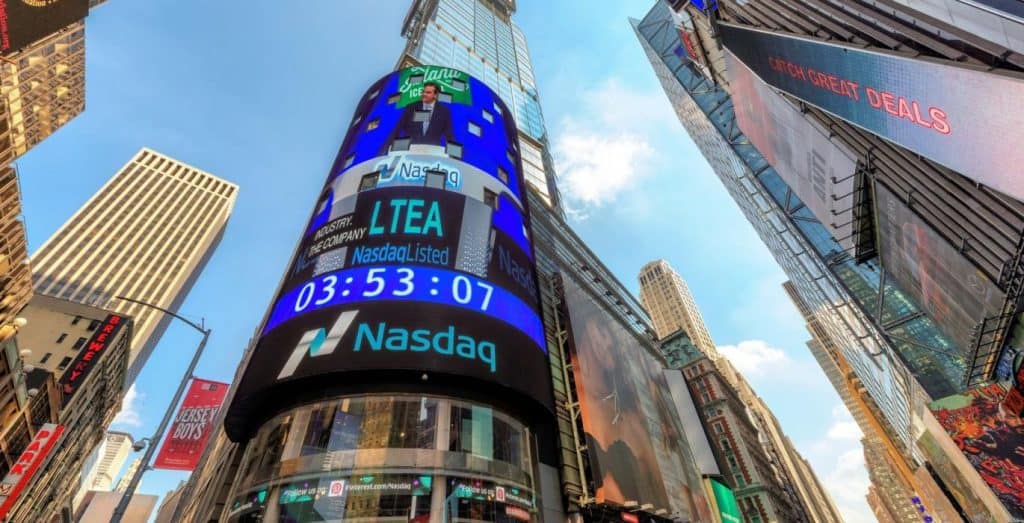
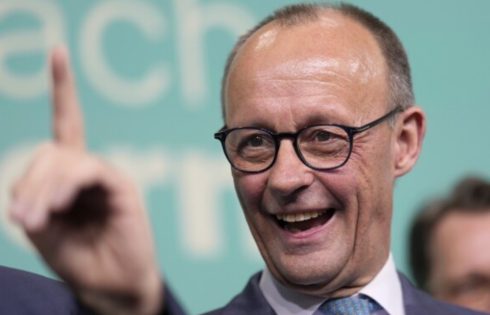
FRANKFURT, Germany (AP) — Germany’s businesses have been frustrated by government inaction on the stagnating economy.
Sunday’s national election raises hopes of a stable two-party coalition of conservatives and center-left Social Democrats, with center-right leader Friedrich Merz as chancellor. But will it take the swift action business leaders are calling for?
Here’s what leading economists and business figures in Germany are saying:
Christian Klein, CEO of business software maker SAP SE
“Tackling key issues, such as too much regulation, a lack of digitalization, and a slow economy, requires bold action.
“Germany needs a government that is open to more innovation, a competitive mindset, and removing excessive regulation that stifles progress and growth – and it needs it now.”
Luxury automaker BMW AG
“We expect from the future federal government that it quickly, comprehensively and sustainable improves the business environment for German industry facing global competition. That includes a competitive tax policy, the pragmatic reduction of bureaucracy and regulation as well as a competitive and business oriented shift in policy at the level of the EU.”
Peter Adrian, CEO of real estate firm Triwo AG and president of German Chamber of Industry and Commerce
“The high voter turnout (82.5%) shows that it’s not just the business community that senses the enormous importance of the decisions that lie ahead. A change of direction is overdue.”
Carsten Brzeski, chief of global macro at ING bank.
The new government must “focus on getting the economy out of its structural stagnation…if the main motivation of such a coalition is to prevent the (far-right) AfD from winning the next election – a likely scenario if the next government doesn’t succeed.”
Thorsten Groeger, head of the IG Metall industrial union in Lower Saxony and Saxony Anhalt regions
“Time is pressing, because more and more companies are cutting jobs and deciding against investing in our location here at home. Billions have to flow into energy security, modern streets and rail lines, high speed networks, innovative technologies, strong education, affordable housing and a welfare state that leaves no one behind.”
Peter Leibinger, head of the Federation of German Industries
“The parties must now prove that they have understood the seriousness of the situation and are prepared to act courageously, quickly and together: the dangerous downward spiral of missing investment and weak growth must be stopped.”
Holger Schmieding, chief economist Berenberg Bank
“Now for the bad news. Populist parties from the political fringes (AfD and the left-wing The Left) have garnered more than one third of seats together. The populists can thus veto any loosening of the debt brake enshrined in the constitution. At a time when it is crucial to raise spending for the military and Ukraine and ease the tax burden for workers and firms, Germany may struggle to find the fiscal space to do so.”
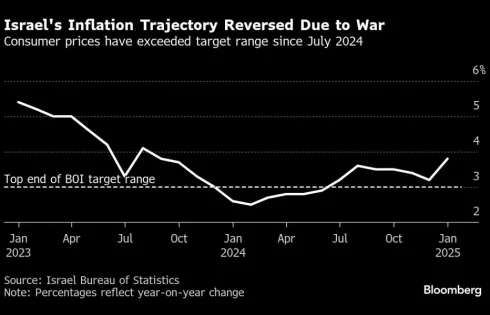
Israel kept interest rates on hold for a ninth straight meeting, with the central bank waiting for war-induced inflation to slow before starting an easing cycle.
The Bank of Israel held its base rate at 4.5%, according to a statement on Monday, a decision in line with all analysts in a Bloomberg survey.
“In view of the continuing war, the Monetary Committee’s policy is focused on stabilizing markets and reducing uncertainty, alongside price stability and supporting economic activity,” the central bank said in a statement following the decision.
Guidance was unchanged from previous months. “The interest-rate path will be determined in accordance with the convergence of inflation to its target, continued stability in the financial markets, economic activity, and fiscal policy,” the central bank said.
Israel’s economy is starting to recover from the strain of conflicts with Iranian-backed militant groups, after ceasefires in Gaza and in Lebanon. Yet annual inflation is running at 3.8%, above the country’s official target of 1% to 3%. That’s mainly due to a hike in value-added tax aimed at funding Israel’s higher defense needs and in electricity and water costs.
Citigroup Inc. said ahead of Monday’s rates decision that Governor Amir Yaron may start cutting rates by May, provided inflation decelerates and risk premiums related to Israel’s conflict remain under control.
The central bank noted that, according to forecasters’ projections, inflation should fall below 3% in the second half of the year, and that 12-month expectations are within the target range.
“In contrast to the situation in the US, inflation expectations in Israel are low, and the fiscal situation also looks better,” Bank Hapoalim, one of Israel’s two largest lenders, said in a note to clients last week.
Bringing inflation down is seen as one of the last major obstacles to monetary easing, with Israeli assets, including the shekel and the country’s credit-default swaps, having largely stabilized on the back of the truces from late last year.
The Israeli shekel is up 1.8% against the dollar in 2025, roughly in line with other so-called expanded-major currencies tracked by Bloomberg.
But there’s no guarantee the ceasefires will hold, particularly in Gaza. The initial stage of that pause ends this coming weekend, and there’s been little indication yet that terms on an extension will be agreed.
Another cause for uncertainty is the 2025 budget, which is meant to be passed by the end of March. There’s a chance it could be derailed by members of Prime Minister Benjamin Netanyahu’s coalition over domestic political disputes.
Lower borrowing costs could help boost Israel’s $550 billion economy. Gross domestic product rose 1% last year, the lowest in over two decades, excluding the Covid-19 pandemic. That was mainly due to a slump in investments, exports and private consumption, which offset an increase in defense-related expenditure.
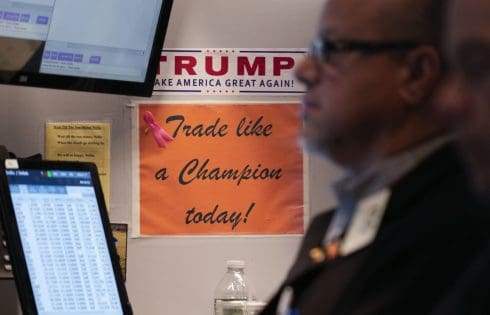 Donald Trump’s election helped turbocharge an already surging bull market in the U.S., sending stocks and cryptocurrencies to record highs.
Donald Trump’s election helped turbocharge an already surging bull market in the U.S., sending stocks and cryptocurrencies to record highs.
Now, some on Wall Street are beginning to sound the alarm that the fast times can’t last.
JPMorgan Chase CEO Jamie Dimon and others have warned that investors are plowing cash into stocks with inflated prices. Hedge fund giant Elliott Management said the blistering rise in crypto over the last year, with bitcoin up 89 percent, is the stuff of bubbles. So-called memestocks — companies like GameStop, whose shares tend to be driven by investor hype — have returned. And on top of that, economists say Trump’s plans for tariffs and an immigration crackdown — along with the dizzying pace of his policy moves — could roil the markets by stoking inflation and fueling uncertainty.
“For good or bad, depending on your politics, we’re back to the chaos presidency,” said Jim Chanos, a hedge fund manager who famously bet against Enron and other failing companies. “Whatever you might think about the Biden administration, if you were a market participant, you generally didn’t need to check your Twitter feed the first thing in the morning when you woke up just to see what was said. But we’re back to that, and with that, comes probably more volatility.”
It isn’t just Trump, of course. The markets are coming off back-to-back banner years fed by a mix of pandemic stimulus money, wild optimism about artificial intelligence, and a supersized interest rate cut by the Federal Reserve last year. But the brewing anxiety over an overvalued market now portends potential problems for the White House.
Trump — who is fond of touting market highs as indications of his success as America’s chief executive — is fixated on lifting up businesses and consumers. A stock market slide could undercut his reputation as a pro-growth president and scramble his administration’s economic plans if it’s forced to deal with the fallout.
“Everyone who puts on the nightly news or even watches Twitter knows what the stock market does every day,” said Ed Hill, a veteran financial industry lobbyist. “It’s become a preferred measure of the economy, even though we all know it doesn’t really reflect the economy. People are going to be very sensitive. This administration particularly is going to be very sensitive to markets.”
To be sure, naysayers are nothing new on Wall Street or in crypto, and Trump’s allies argue that the president’s plans will boost the markets over time.
Hal Lambert, a Republican donor and founder of investment management firm Point Bridge Capital, said the combination of Elon Musk’s cost-cutting campaign, the expected extension of the 2017 tax cuts, and lower oil prices represent major economic windfalls to come. And in the meantime, he said, U.S. stock investors aren’t going anywhere.
“People aren’t going to sit around and hold money markets, and they’re not going to sit around and buy three [or] four percent Treasuries,” Lambert said. “They’re going to keep investing in the equity markets.”
Indeed, investors aren’t slowing down much. The benchmark index for U.S. stocks, the S&P 500, closed at a new all-time high Wednesday. And crypto has continued to surge, with bitcoin — the world’s most valuable crypto token — remaining at sky-high valuations after breaking through $100,000 earlier this year.
Most Wall Street banks and research shops still believe investors are in for a generally positive 2025, as do everyday buyers themselves. More than half of consumers are expecting stocks to increase over the course of 2025, according to the Conference Board.
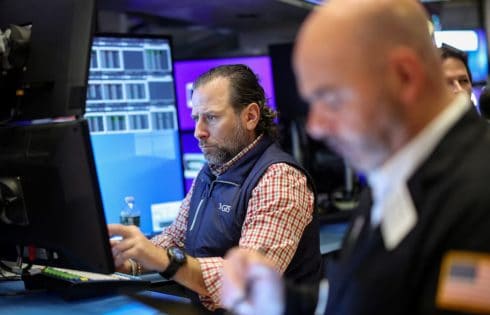 The Nasdaq Composite fell more than 1% on Monday, with big technology stocks creating the biggest drag as investors worried about demand for technology supporting artificial intelligence while they waited for results from market heavyweight Nvidia.
The S&P 500 closed slightly lower, marking its third straight day of declines, while the Dow managed to eke out a tiny gain. It was also Nasdaq’s third consecutive loss and its fourth daily drop of more than 1% so far in February.
Investors were concerned about future demand for Nvidia’s (NVDA.O), opens new tab pricey AI chips as they awaited its quarterly results on Wednesday. Worries about hefty spending on the technology have mounted since low-cost AI models from China’s DeepSeek rattled the industry in January.
Adding to uncertainty, a TD Cowen analyst note published late on Friday reported that Microsoft Corp (MSFT.O), opens new tab has scrapped leases for sizeable data center capacity in the U.S., suggesting a potential oversupply of AI infrastructure.
Microsoft said its plan to invest over $80 billion in AI and cloud capacity this fiscal year was intact but that it “may strategically pace or adjust” infrastructure in some areas.
“Markets are already jittery and looking for a reason to take profits,” said Gene Goldman, chief investment officer at Cetera Investment Management, noting that any question about AI is seen as a reason to take profits since the technology has driven market growth for the last few years.
Along with worries about tariffs and inflation, investors are getting more anxious about economic growth after last week’s batch of weak economic data and a disappointing forecast from Walmart (WMT.N), opens new tab.
“Volatility is being driven by market uncertainty about whether we’re facing a growth scare or an inflation scare,” said Goldman.
The Dow Jones Industrial Average (.DJI), opens new tab rose 33.19 points, or 0.08%, to 43,461.21, the S&P 500 (.SPX), opens new tab lost 29.88 points, or 0.50%, to 5,983.25 and the Nasdaq (.IXIC), opens new tab lost 237.08 points, or 1.21%, to 19,286.93.
The more defensive healthcare index (.SPXHC), opens new tab led percentage gains, closing up 0.75% while technology (.SPLRCT), opens new tab was the biggest laggard, ending down 1.43%.
Nvidia was the S&P 500’s biggest index point drag, ending the session down 3.1%, and it was followed by chip maker Broadcom Inc (AVGO.O), opens new tab, down 4.9%, Amazon.com (AMZN.O), opens new tab, down 1.8%. Microsoft shares ended down 1%.
The tech sector’s biggest percentage decliner with, a 10.5% drop, was another popular AI stock, Palantir Technologies (PLTR.O), opens new tab.
“The dominance of the AI tech trade has run its course, not that these companies aren’t great stocks. We’re headed for a major digestion phase,” said Peter Boockvar, CIO at Bleakley Financial Group.
On the data front, the Personal Consumption Expenditure index – the Federal Reserve’s preferred inflation gauge – is expected on Friday and could help markets gauge the timing of the central bank’s first rate cut this year.
Interest rate futures indicate trader expectations that the Fed will leave borrowing costs unchanged until June, according to CME Group’s FedWatch, opens new tab tool.
In individual stocks, Apple (AAPL.O), opens new tab finished up 0.7% after the iPhone maker unveiled plans to spend $500 billion in U.S. investments in the next four years, including setting up a factory in Texas for AI servers.
Berkshire Hathaway (BRKa.N), opens new tab, shares hit record highs in early trading, after Warren Buffett’s conglomerate reported a record annual profit and its class B shares ended up more than 4%.
Nike (NKE.N), opens new tab finished up 4.9% after Jefferies raised its rating to “buy” from “hold”.
Declining issues outnumbered advancers by a 1.25-to-1 ratio on the NYSE where there were 90 new highs and 134 new lows.
On the Nasdaq, 1,518 stocks rose and 2,888 fell as declining issues outnumbered advancers by a 1.9-to-1 ratio. The S&P 500 posted 28 new 52-week highs and 8 new lows while the Nasdaq recorded 40 new highs and 232 new lows.
On U.S. exchanges about 15.32 billion shares changed hands compared with the 15.34 billion average for the last 20 sessions.
The Nasdaq Composite fell more than 1% on Monday, with big technology stocks creating the biggest drag as investors worried about demand for technology supporting artificial intelligence while they waited for results from market heavyweight Nvidia.
The S&P 500 closed slightly lower, marking its third straight day of declines, while the Dow managed to eke out a tiny gain. It was also Nasdaq’s third consecutive loss and its fourth daily drop of more than 1% so far in February.
Investors were concerned about future demand for Nvidia’s (NVDA.O), opens new tab pricey AI chips as they awaited its quarterly results on Wednesday. Worries about hefty spending on the technology have mounted since low-cost AI models from China’s DeepSeek rattled the industry in January.
Adding to uncertainty, a TD Cowen analyst note published late on Friday reported that Microsoft Corp (MSFT.O), opens new tab has scrapped leases for sizeable data center capacity in the U.S., suggesting a potential oversupply of AI infrastructure.
Microsoft said its plan to invest over $80 billion in AI and cloud capacity this fiscal year was intact but that it “may strategically pace or adjust” infrastructure in some areas.
“Markets are already jittery and looking for a reason to take profits,” said Gene Goldman, chief investment officer at Cetera Investment Management, noting that any question about AI is seen as a reason to take profits since the technology has driven market growth for the last few years.
Along with worries about tariffs and inflation, investors are getting more anxious about economic growth after last week’s batch of weak economic data and a disappointing forecast from Walmart (WMT.N), opens new tab.
“Volatility is being driven by market uncertainty about whether we’re facing a growth scare or an inflation scare,” said Goldman.
The Dow Jones Industrial Average (.DJI), opens new tab rose 33.19 points, or 0.08%, to 43,461.21, the S&P 500 (.SPX), opens new tab lost 29.88 points, or 0.50%, to 5,983.25 and the Nasdaq (.IXIC), opens new tab lost 237.08 points, or 1.21%, to 19,286.93.
The more defensive healthcare index (.SPXHC), opens new tab led percentage gains, closing up 0.75% while technology (.SPLRCT), opens new tab was the biggest laggard, ending down 1.43%.
Nvidia was the S&P 500’s biggest index point drag, ending the session down 3.1%, and it was followed by chip maker Broadcom Inc (AVGO.O), opens new tab, down 4.9%, Amazon.com (AMZN.O), opens new tab, down 1.8%. Microsoft shares ended down 1%.
The tech sector’s biggest percentage decliner with, a 10.5% drop, was another popular AI stock, Palantir Technologies (PLTR.O), opens new tab.
“The dominance of the AI tech trade has run its course, not that these companies aren’t great stocks. We’re headed for a major digestion phase,” said Peter Boockvar, CIO at Bleakley Financial Group.
On the data front, the Personal Consumption Expenditure index – the Federal Reserve’s preferred inflation gauge – is expected on Friday and could help markets gauge the timing of the central bank’s first rate cut this year.
Interest rate futures indicate trader expectations that the Fed will leave borrowing costs unchanged until June, according to CME Group’s FedWatch, opens new tab tool.
In individual stocks, Apple (AAPL.O), opens new tab finished up 0.7% after the iPhone maker unveiled plans to spend $500 billion in U.S. investments in the next four years, including setting up a factory in Texas for AI servers.
Berkshire Hathaway (BRKa.N), opens new tab, shares hit record highs in early trading, after Warren Buffett’s conglomerate reported a record annual profit and its class B shares ended up more than 4%.
Nike (NKE.N), opens new tab finished up 4.9% after Jefferies raised its rating to “buy” from “hold”.
Declining issues outnumbered advancers by a 1.25-to-1 ratio on the NYSE where there were 90 new highs and 134 new lows.
On the Nasdaq, 1,518 stocks rose and 2,888 fell as declining issues outnumbered advancers by a 1.9-to-1 ratio. The S&P 500 posted 28 new 52-week highs and 8 new lows while the Nasdaq recorded 40 new highs and 232 new lows.
On U.S. exchanges about 15.32 billion shares changed hands compared with the 15.34 billion average for the last 20 sessions.